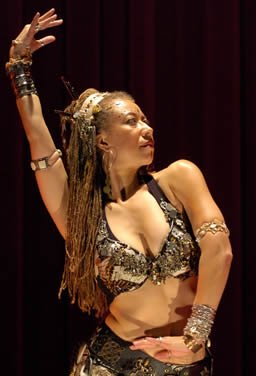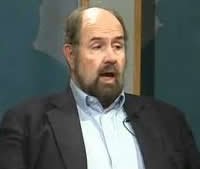‘Tribal fusion’ dancer and anthropologist explore collective identity of the arts, Oct. 18 at SU
Event follows keynote address by under secretary of state for public diplomacy and public affairs

Syracuse Symposium, whose theme this fall is “Memory-Media-Archive,” continues with a joint program featuring a dance performance by Donna Mejia and a lecture by anthropologist William Beeman. The event, titled “The Negotiation of Power, Transnationalism, and Collective Identity in the Performing Arts,” is Thursday, Oct. 18, at 7 p.m. in Hergenhan Auditorium in Newhouse 3. It is free and open to the public. For more information, call 315-443-5708.
“The Negotiation of Power” is sponsored by The SU Humanities Center in The College of Arts and Sciences and by the Association of Public Diplomacy Scholars (ADPS) in the Maxwell and Newhouse schools. Additional support comes from the Graduate Student Organization, the Moynihan Institute of Global Affairs in the Maxwell School, and the Phi Beta Delta honor society.
The event is also part of ADPS’ annual symposium, “The Politics of Change,” taking place Oct. 18-19 in Hergenhan Auditorium. The symposium begins at 4 p.m. with a keynote address by Tara D. Sonenshine, under secretary of state for public diplomacy and public affairs, on the role of public diplomacy in modern statecraft. This lecture is also free and open to the public.
“’Negotiation of Power’ will explore transnational identity and communal values through digital technologies” says Gregg Lambert, Dean’s Professor of the Humanities and founding director of The SU Humanities Center. “Donna Mejia is an accomplished dancer and choreographer whose work draws on new fusion traditions in world electronica. William Beeman, in turn, is an accomplished singer who also is an expert on Middle East culture and social patterns. Together, they will highlight the interconnected nature of intercultural dialogues in international affairs.”
Mejia is assistant professor of dance at the University of Colorado at Boulder. She has served as artist-in-residence at more than a dozen institutions throughout the country, and has held leadership positions with numerous arts organizations, including the award-winning Harambee Dance Company.
As a performer and choreographer, Mejia specializes in “tribal fusion,” an emerging genre of dance combining Arab, African, and nomadic traditions with American hip hop and electronica. She also is among a handful of artists authorized to instruct the Brazilian Silvestre Modern Dance Technique, an esoteric, codified system of contemporary dance.
“The Negotiation of Power” is sponsored by The SU Humanities Center in The College of Arts and Sciences and by the Association of Public Diplomacy Scholars (ADPS) in the Maxwell and Newhouse schools. Additional support comes from the Graduate Student Organization, the Moynihan Institute of Global Affairs in the Maxwell School, and the Phi Beta Delta honor society.
The event is also part of ADPS’ annual symposium, “The Politics of Change,” taking place Oct. 18-19 in Hergenhan Auditorium. The symposium begins at 4 p.m. with a keynote address by Tara D. Sonenshine, under secretary of state for public diplomacy and public affairs, on the role of public diplomacy in modern statecraft. This lecture is also free and open to the public.
“’Negotiation of Power’ will explore transnational identity and communal values through digital technologies” says Gregg Lambert, Dean’s Professor of the Humanities and founding director of The SU Humanities Center. “Donna Mejia is an accomplished dancer and choreographer whose work draws on new fusion traditions in world electronica. William Beeman, in turn, is an accomplished singer who also is an expert on Middle East culture and social patterns. Together, they will highlight the interconnected nature of intercultural dialogues in international affairs.”
Mejia is assistant professor of dance at the University of Colorado at Boulder. She has served as artist-in-residence at more than a dozen institutions throughout the country, and has held leadership positions with numerous arts organizations, including the award-winning Harambee Dance Company.
As a performer and choreographer, Mejia specializes in “tribal fusion,” an emerging genre of dance combining Arab, African, and nomadic traditions with American hip hop and electronica. She also is among a handful of artists authorized to instruct the Brazilian Silvestre Modern Dance Technique, an esoteric, codified system of contemporary dance.

Beeman is professor and chair of anthropology at the University of Minnesota. Much of his research has involved sociolinguistics and the semantics of interaction, as well as cross-cultural comparisons of theatrical and performance genres. More recently, he has delved into neuroscience and cognition vis-à-vis music and theatrical performance.
In addition to being an expert on the Middle East and Central Asia, Beeman is an internationally sought-after operatic singer.
“The program will trace the evolution of culture, through the interaction and exchange of ideas and practices among culturally distinct groups,” adds Lambert. “As governments and foreign publics interact with one another, they exchange messages about their cultural values and traditions.”
Launched in 2001, Syracuse Symposium has become a fall tradition at SU, drawing thousands of people to free lectures, panel discussions, performances and exhibitions built on annual themes. Past symposia include “Identity,” “Conflict: Peace and War,” “Migration,” “Justice” and “Light.”
The SU Humanities Center, founded in 2008, fosters public engagement in the humanities, and is home to the Central New York Humanities Corridor; the Watson Visiting Collaborator and Jeanette K. Watson Distinguished Visiting Professorship programs; the HC Mini-Seminar and Syracuse Symposium Seminar series; and other research initiatives, annual fellowships and public programming.
SU offers two graduate degrees in public diplomacy: a master of arts in international relations and a master of science in public relations. Drawing on intensive academic and practical training, the program involves students and faculty from the Maxwell and Newhouse schools, as well as a variety of partners around the world, including those in New York; Washington, D.C.; and Geneva (Switzerland).
Media Contact
Rob Enslin
